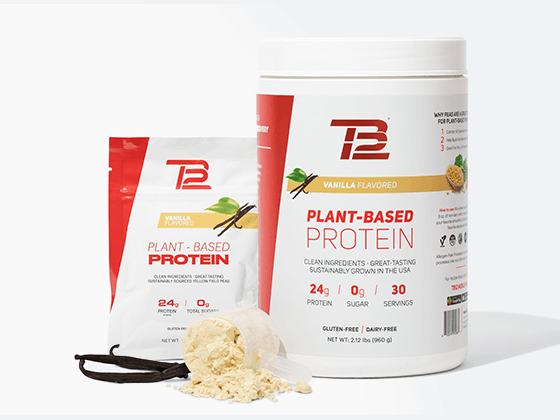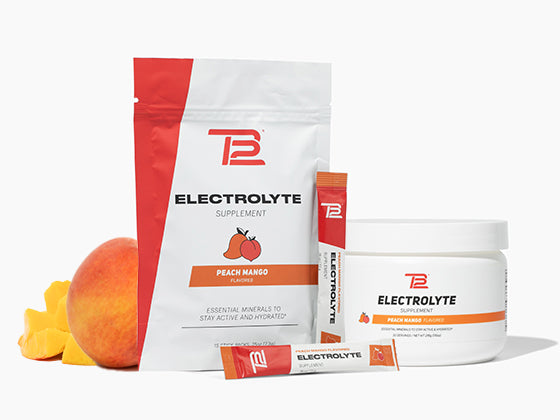
We think we can all agree that everyone benefits from a good night’s sleep! But getting consistently good sleep is the real challenge. One of the key ways to increase the quality of your sleep is being consistent with your sleep routine. By building good sleep habits, you’ll experience deeper and more restful sleep, and see an increase in your overall energy and performance.
At TB12, we’re extremely passionate about recovery and sleep is a core component of recovery. Sleep not only helps us recover mentally from long and stressful days (and fun and exciting days too!), but it helps our muscles, organs, and cells to repair, restore, and re-energize for the next day’s activities. Sleep is also critical for consolidating and storing our memories so getting rest is paramount for staying mentally sharp.
In order to set yourself up for success throughout the day, we recommend trying to limit your caffeine consumption, staying active, and minimizing your screen time whenever possible. Body Coach Paul encourages his clients to “set an alarm to tell yourself to go to sleep so you can have the discipline to get a full night’s rest.” By holding yourself accountable to a consistent sleeping and waking schedule each day, you’ll find that over time it becomes easier to both fall asleep and wake up. You may also experience improved alertness, decreased caffeine dependence, and sharper focus.
We encourage you to build a routine that works with your schedule and your lifestyle, but here is a sample routine to help you get started!
01
7:30pm: Get Pliable by Rolling Out
Using your TB12 Pliability Roller or TB12 Pliability Sphere, we encourage you to roll out for 20 minutes each night. Rolling out before going to sleep will accelerate your recovery and gives you the opportunity to work through any knots or points of tension within your body. Opening up and relaxing your muscles before going to sleep will also help your body feel physically calmer when you lay down in your bed.
02
8:00pm: Unwind With Some Tea
If you’re looking for something warm with which to wrap your day, we recommend making some bedtime tea – such as chamomile, ginger, or lavender. If you’re looking for something a bit more substantial, we encourage you to try our Sleep Well Smoothie.
Hydration is important at all points of the day, and dehydration can often be associated with lethargy and fatigue, which is why we recommend aiming to drink at least half your weight in ounces of water daily. That said, we recommend easing up on your liquid consumption two hours before bed so that you aren’t interrupting your sleep in the middle of the night to use the bathroom.
03
9:00: Put Your Phone Down
Around an hour before bedtime, we recommend putting your phone away to reduce blue light exposure. Exposure to light, and specifically blue light, when you’re getting ready to go to sleep suppresses your body’s secretion of melatonin, a hormone that influences circadian rhythms and helps lull you into a deep sleep. If you’re able to, we encourage you to charge your phone somewhere other than your bedroom to reduce the temptation to check your phone before falling asleep, or if you happen to wake up during the night. At the very least, put your phone face down so the light emitted from your phone doesn’t distract you.

04
9:05: Relax Your Mind
Dim the lights a bit and grab your favorite book or put on your favorite podcast. Reading before bed can help you slow down your mind and prevent yourself from stressing tomorrow’s about commitments. Getting immersed in a good book allows your mind to escape, and wind down as a result. We recommend using a paper book as opposed to using a tablet or electronic reading device to minimize blue light in the bedroom.
Reading not your thing? No problem at all—listening to a calming and engaging podcast on a gentle volume has similar effects!
Optional: If you’re looking for some additional sleep support, we recommend taking our natural and non-habit forming sleep supplement, TB12 Sleep, 30-45 minutes before bedtime. You can read about the sleep supporting ingredients here!
05
9:45: Meditate and Think
Right before bed, take some time to meditate and think or write about what you’re grateful for. Some studies have shown that taking the time to express gratitude daily may help soothe the nervous system, which may help you fall asleep faster.
Expressing gratitude shortly before going to sleep is also associated with positive, rather than pessimistic, thoughts as you’re falling asleep. Rather than thinking about how anxious you are for tomorrow’s presentation, you’re thinking about how you landed the client or a great conversation you had with your family at dinner.
06
10:00: Go To Sleep
Go to sleep! This one is pretty simple—turn off the lights, lay down, pull the covers up, and close your eyes. The ideal temperature for sleeping is around 65 degrees Fahrenheit. If you’re too hot or cold at night, you’ll be too uncomfortable for quality sleep. If you’re sensitive to noise at night or live in a big city, a white noise machine can help drown out the ambient sounds.
Getting a good night’s sleep tonight sets you up for success tomorrow — sleep tight!
For more tips on getting a good nights sleep, check out our downloadable Sleep Guide






